|
|
|
Sort Order |
|
|
|
Items / Page
|
|
|
|
|
|
|
| Srl | Item |
| 1 |
ID:
124516
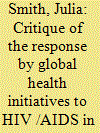

|
|
|
|
|
| Publication |
2013.
|
| Summary/Abstract |
This article provides a critical perspective on global health initiatives (GHIs) in response to HIV/AIDS in post-conflict African countries. Focusing on the Global Fund to Fight HIV/AIDS, Tuberculosis and Malaria, the President's Emergency Plan for AIDS Relief and UN bodies, it argues that many global health initiatives lack consideration of the complexities of addressing HIV/AIDS in post-conflict contexts. It finds that prevention programmes fail to prioritize the population groups who are at high risk; that treatment and care interventions are shaped by an emergency aid paradigm, which does not ensure ongoing well-being for people living with HIV/AIDS; and that global health initiatives often impede the capacity of local governance and health systems. Given that global health initiatives have yet to fully engage with the challenges of implementing HIV/AIDS interventions in conflict-affected African contexts, the article concludes by proposing recommendations in this regard.
|
|
|
|
|
|
|
|
|
|
|
|
|
|
|
|
| 2 |
ID:
124510
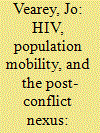

|
|
|
|
|
| Publication |
2013.
|
| Summary/Abstract |
As with many issues associated with the movement of people, linkages between mobility, HIV, conflict and post-conflict settings have often been based on conjecture rather than fact. Conflict was assumed to increase transmission of HIV, and displaced populations, refugees and armed forces were presumed to have higher HIV prevalence than host communities. However, recent evidence challenges these assumptions. This article explores the complex relationship between HIV and post-conflict settings, and considers if and how migrants and mobile populations - including returning refugees - are at increased risk of HIV acquisition in post-conflict settings.
|
|
|
|
|
|
|
|
|
|
|
|
|
|
|
|
| 3 |
ID:
124514
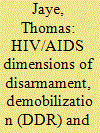

|
|
|
|
|
| Publication |
2013.
|
| Summary/Abstract |
Countries emerging from conflict situations face enormous social, economic, security and political challenges. Contemporary conflicts tend to lead to state and societal collapse, and are characterized by sexual violence and the destruction of fragile economies. Ensuring a safe and secure post-conflict environment for the pursuit of normal life is integral to post-war reconstruction and development processes, and post-conflict environments offer entry points for addressing both the origins and the effects of wars. Accordingly, this article argues that disarmament, demobilization and reintegration (DDR), and security sector reform (SSR), provide important opportunities for incorporating HIV/AIDS issues into broader national security frameworks. Further, the article argues that securitizing HIV/AIDS can ensure that responses to the epidemic are prioritized, but also that the treatment of security personnel should not be privileged over treatment of those who are infected in the larger population.
|
|
|
|
|
|
|
|
|
|
|
|
|
|
|
|
| 4 |
ID:
124511
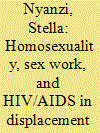

|
|
|
|
|
| Publication |
2013.
|
| Summary/Abstract |
This article aims to disrupt the silence, invisibility and erasures of non-heteronormative sexual orientations or gender identities, and of sex work, in HIV/AIDS responses within displacement and post-conflict settings in Africa. Informed by Gayle Rubin's sexual hierarchy theoretical framework,1 it explores the role of discrimination and violation of the rights of sex workers and of gender and sexual minorities in driving the HIV/AIDS epidemic during displacement. Specific case materials focus on ethnographic research conducted in urban and rural Uganda. Recommendations for policy, practice and programmes are outlined.
|
|
|
|
|
|
|
|
|
|
|
|
|
|
|
|
| 5 |
ID:
124512
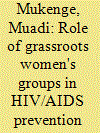

|
|
|
|
|
| Publication |
2013.
|
| Summary/Abstract |
The unique experiences of women and girls in conflict situations have been highlighted in key research over the past two decades,1 warranting the need for a gendered approach in post-conflict reconstruction processes. This article focuses on the emergence of HIV in such settings and highlights the contributions of women's groups to HIV interventions and policy formulation, using case studies from Sierra Leone and the Democratic Republic of the Congo (DRC). The article argues for the need for a much deeper gender analysis in HIV intervention strategies, and concludes with recommendations to ensure access to justice and health services for women.
|
|
|
|
|
|
|
|
|
|
|
|
|
|
|
|
| 6 |
ID:
124513
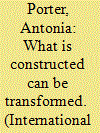

|
|
|
|
|
| Publication |
2013.
|
| Summary/Abstract |
This article explores masculinities in post-conflict contexts in Africa and the need for their transformation. It commences with an examination of the constructs of masculinity and masculinities, and presents perspectives on masculinities in Africa, including possible sources of gender conditioning on the continent. The article then reviews the main roles that men play and the various conditions that confront them during and after violent conflicts in Africa, and examines particular features and challenges that men and their masculinities face in African post-conflict societies. Lastly, the article reviews some practical interventions that aim to transform masculinities in various contexts, and suggests possible avenues towards more effective and sustainable transformation.
|
|
|
|
|
|
|
|
|
|
|
|
|
|
|
|
|
|
|
|
|